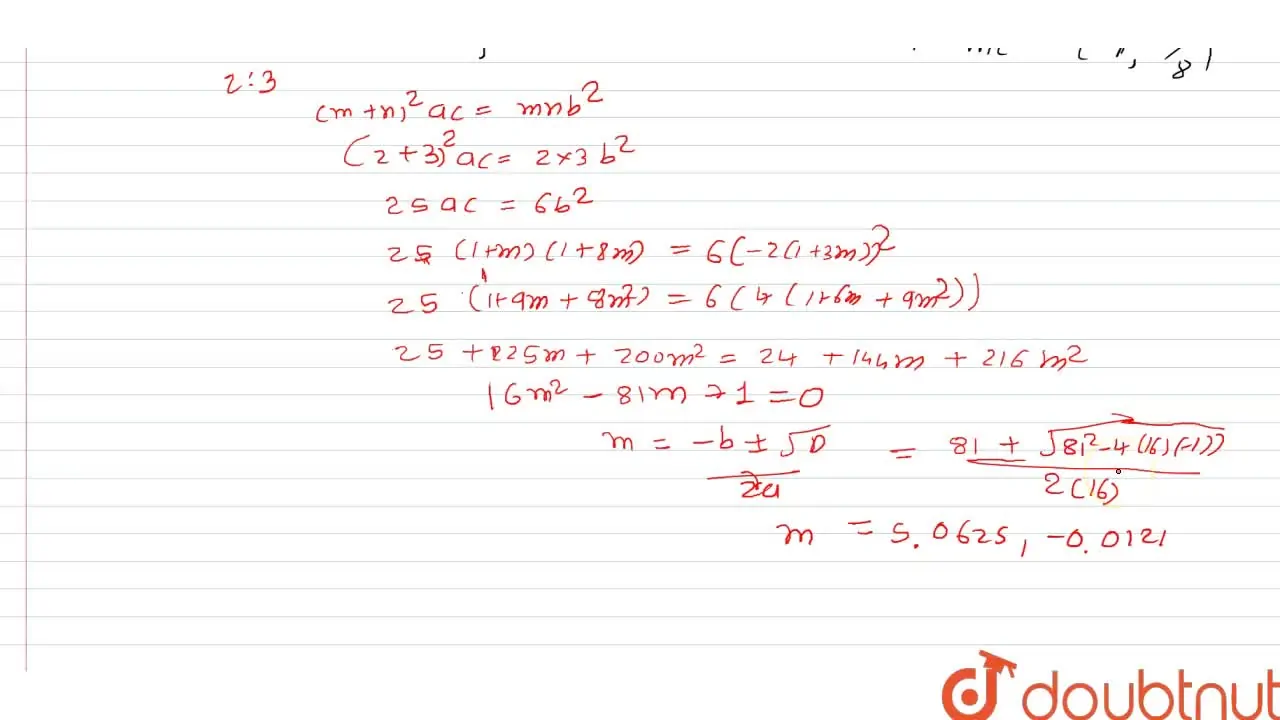For what values of m the equation (1+m)x2−2(1+3m)x+(1+8m)=0 has (m∈R)
(i) both roots are imaginary?
(ii) both roots are equal?
(iii) both roots are real and distinct?
(iv) both roots are positive?
(v) both roots are negative?
(vi) roots are opposite in sign?
(vii)roots are equal in magnitude but opposite in sign?
(viii) atleast one root is positive?
(ix) atleast one root is negative?
(x) roots are in the ratio 2:3?Solution in Gujrati
The correct Answer is:(i) mε(0,3) (ii) m=0,3 (iii) mε(−∞,0)u(3,∞) (iv) mε(−∞,−1)∪[3,∞)
(v) mεϕ
(vi) mε(−1,−1/8)
(vii) m=−1/3 (viii) mε(−∞,−1)∪(−1,−1/8)∪[3,∞) (ix) mε(−1,−1/8) (x) m=81±√662532
∵(1+m)x2−2(1+3m)x+(1+8m)=0
⇒D=4(1+3m)2−4(1+m)(1+8m)=4m(m−3)
(i) Both roots are imaginary.
∴D<0
⇒4m(m−3)<0
⇒0<m<3
or mε(0,3)
(ii) Both roots are equal
∴D=0
⇒4m(m−3)=0
⇒m=0,3
(iii) Both roots are real and distinct
∴D>0
⇒4x(m−3)>0
⇒m<0 or m>3
∴mε(−∞,0)∪(3,∞)
(iv) Both roots are positive.
Case I Lsum of the roots >0
⇒2(1+3m)(1+m)>0
⇒mε(−∞,−1)∪(−13,∞)
Case II Produc of the roots >0
⇒(1+8m)(1+m)>0
mε(−∞,−1)∪(−18,∞)
Case IIID≥0
⇒4m(m−3)≥0
mε(−∞,0]∪[3,∞)
Combining all Cases, we get
mε(−∞,−1)∪[3,∞)
(v) Both roots are negative.
Consider the following cases:
Case I Sum of the roots <0⇒2(1+3m)(1+m)<0
⇒mε(−1,−13)
Case II Product of the roots >0⇒(1+8m)(1+m)>0
⇒mε(−∞,1)∪(−18,∞)
Case III D≥0
4m(m−3)≥0⇒mε(−∞,0]∪[3,∞)
Combining all cases we get
mεϕ
(vi) Roots are opposite in sign, then
Case I Consider the following cases:
Product of the roots <0
⇒(1+8m)(1+m)<0
mε(−1,−18)
Case II D>0⇒4m(m−3)>0
⇒mε(−∞,0)∪(3,∞)
Combining all cases we get
mε(−1,−18)
(vii) Roots are equal in magnitude but opposite in sign, then Consider the following cases:
Case I Sum of the roots =0
⇒2(1+3m)(1+m)=0
⇒m=−13,m≠1
Case D>0⇒4m(m−3)>0
⇒mε(−∞,0)∪(3,∞)
Combining all cases we get
m=−13
(viii) Atleast one root is positive, then either one root si positive or bothh roots are positive
i.e. (d) ∪(f)<br>orm epsilon (-oo,-1)uu(-1.-1/8)uu[3,oo)<br>(ix)At≤∗o≠i√s¬ative,theneithero≠i√s¬ativeor⊥hs√are¬ative.<br>i.e.(e)duu(f)orm epsilon (-1,-1/8)<br>(x)Lets√are2 alphaare3 alpha.Then<br>Consrthefollow∈gcases:<br>CaseISumofthes√=2alpha+3 alpha=(2(1+3m))/((1+m))<br>implies alpha=(2(1+3m))/(5(1+m))<br>CaseIIProductofthes√=2 alpha.3 alpha=((1+8m))/((1+m))<br>implies6 alpha^(2)=((1+8m))/((1+m))<br>FromEqsiandiiwe≥t<br>6{(2(1+3m))/(5(1+m))}^(2)=((1+8))/((1+m))<br>implies24(1+3m)^(2)=25(1+8m)(1+m)<br>implies24(9m^(2)+6m+1)=25(8m^(2)+9m+1)<br>=16m^(2)-81m-1=0<br>orm=(81+-sqrt((-81)^(2)+64))/32<br>impliesm=(81+-sqrt(6625))/32
Similar Questions
यदि a>1 हो, तो समीकरण (1−a)x2+3ax−1=0 के होंगे
(a) एक धनात्मक व एक ऋणात्मक मूल (b) दोनों ऋणात्मक मूल
(c) दोनों धनात्मक मूल (d) दोनों अवास्तविक मूल03:03View SolutionWite down the corresponding elements in the figure : 1)……………… br 2)…………… br 3).……………. Br 4)………….. Br 5)…………. Br 6)…………..
 01:38View Solution
01:38View SolutionLet 4x2−4(α−2)x+α−2=0(α∈R) be a quadratic equation. Find the values of 'a' for which
(i) Both roots are opposite in sign.01:43View SolutionLet x2−2(a−1)x+a−1=0(a∈R) be a quadratic equation, then find the value of 'a' for which
(a) Both the roots are positive
(b)Both the roots are negative
(c) Both the roots are opposite in sign.
(d) Both the roots are greater than 1.
(e)Both the roots are smaller than 1.
(f) One root is small than 1 and the other root is greater than 1.View SolutionFor what values of m the equation (1+m)x2−2(1+3m)x+(1+8m)=0 has (m∈R)
(i) both roots are imaginary?
(ii) both roots are equal?
(iii) both roots are real and distinct?
(iv) both roots are positive?
(v) both roots are negative?
(vi) roots are opposite in sign?
(vii)roots are equal in magnitude but opposite in sign?
(viii) atleast one root is positive?
(iv) atleast one root is negative?
(x) roots are in the ratio 2:3?19:11View SolutionLet x2−(m−3)x+m=0(m∈R) be a quadratic equation, then find the values of 'm' for which both
(a) the roots are greater than 2.
(b) both roots are positive,
( c) one root is positive and other is negative.
( d) One root is greater than 2 and other smaller than 1
( e) Roots are equal in magnitude and opposite in sign,
( f) both roots lie in the interval (1, 2)07:19View SolutionLet 4x2−4(α−2)x+α−2=0(α∈R) be a quadratic equation. Find the values of 'a' for which
(i) Both roots are real and distinct.
(ii) Both roots are equal.
(iii) Both roots are imaginary
(iv) Both roots are opposite in sign.
(v) Both roots are equal in magnitude but opposite in sign08:17View SolutionLet x2−2(a−1)x+a−1=0(a∈R) be a quadratic equation, then find the value of 'a' for which
(a) Both the roots are positive
(b)Both the roots are negative
(c) Both the roots are opposite in sign.
(d) Both the roots are greater than 1.
(e)Both the roots are smaller than 1.
(f) One root is small than 1 and the other root is greater than 1.07:03View Solution


